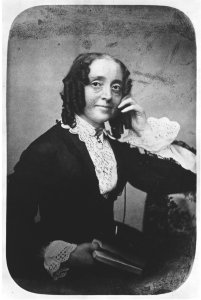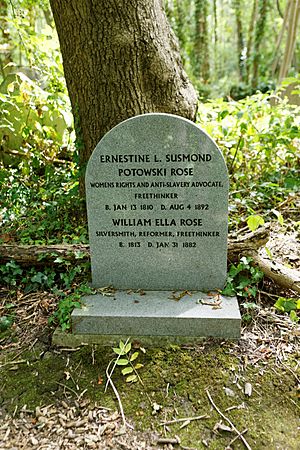Ernestine Rose facts for kids
Quick facts for kids
Ernestine Rose
|
|
|---|---|
 |
|
| Born |
Ernestine Louise Polowsky
January 13, 1810 Piotrków Trybunalski, Duchy of Warsaw, Poland
|
| Died | August 4, 1892 (aged 82) Brighton, England
|
| Resting place | Highgate Cemetery, London, England |
| Nationality | Polish (by birth) American (naturalized) |
| Other names | Ernestine Louise Polowsky |
| Occupation | Manufacturer of perfumed paper |
| Known for | Women's Rights Women's Suffrage Feminism Civil Rights Atheist feminism |
| Spouse(s) | William Ella Rose |
Ernestine Louise Rose (born January 13, 1810 – died August 4, 1892) was a brave woman who fought for many important rights. She was a suffragist, meaning she worked for women's right to vote. She was also an abolitionist, fighting to end slavery. People called her a "freethinker" because she questioned common beliefs.
Some even called her the "first Jewish feminist." She worked from the 1830s to the 1870s. This was at the same time as famous suffragists like Elizabeth Cady Stanton and Susan B. Anthony. Ernestine Rose was a very important thinker in the American women's rights movement. In 1996, she was honored in the National Women's Hall of Fame.
Contents
Early Life and Childhood
Ernestine Louise Potowska was born on January 13, 1810. Her birthplace was Piotrków Trybunalski in what was then the Duchy of Warsaw, Poland. Her father was a rich rabbi, a Jewish religious leader.
Unlike many girls at that time, Ernestine received an education. She even learned Hebrew. When she was five, she started to question things. She wondered why God would make her father fast so often. She later said, "I was a rebel at the age of five."
As she grew older, she questioned her father more about religion. He told her that a young girl should not try to understand her faith. He said she should just accept and believe it. Ernestine later said that this moment made her doubt religion. It also shaped her belief in women's rights.
Leaving Home and New Inventions
When Ernestine was sixteen, her mother passed away. She left Ernestine an inheritance. Without asking Ernestine, her father promised her to a Jewish friend. He wanted her to stay close to their religious community.
Ernestine did not want to marry a man she did not choose or love. She bravely went to a secular court, which was unusual. She argued her own case. The court decided she did not have to marry him. They also said she could keep her inheritance. She chose to give the money back to her father. But she was happy to be free from the marriage.
When she returned home, her father had remarried. His new wife was only sixteen. The situation became difficult, so Ernestine left home at age seventeen.
She traveled to Berlin, Germany. There was a law that said non-Prussian Jews needed a Prussian sponsor. Ernestine went directly to the king and got an exception. Soon after, she invented perfumed paper. This paper was used to make rooms smell nice. She sold it to pay for her travels.
Life in England and America
Ernestine traveled through Belgium, the Netherlands, and France. Finally, she arrived in England. Her journey was tough because her ship was wrecked. She made it to England safely, but she lost all her belongings.
To earn money, she taught German and Hebrew. She also kept selling her perfumed paper. In England, she met Robert Owen. He was a Utopian socialist who believed in ideal societies. He was very impressed by Ernestine. He invited her to speak at a large hall.
Even though her English was not perfect, people loved her speeches. She and Owen became close friends. She helped him start the Association of All Classes of All Nations. This group worked for human rights for everyone. Owen even called her "his daughter."
Marriage and New Beginnings
While in England, Ernestine met William Ella Rose. He was a Christian jeweler and silversmith. He also believed in Owen's ideas. They got married in a civil ceremony, not a religious one. Both of them saw their marriage as a legal agreement, not a religious one.
In May 1836, the Roses moved to the United States. They became citizens and settled in New York City in 1837. They opened a small shop in their home. Ernestine sold her perfumed products, and William ran his silversmith business.
Fighting for Rights
Ernestine Rose soon started giving lectures. She joined the "Society for Moral Philanthropists." She traveled to different states to speak about important issues. These included ending slavery, allowing religious freedom, supporting public education, and gaining equality for women.
Her speeches often caused debate. In the South, where slavery was common, one slaveholder said he would have hurt her if she were a man. In 1855, she was invited to speak against slavery in Bangor, Maine. A local newspaper called her "a female Atheist." Ernestine wrote a letter to another paper to respond. This created so much buzz that everyone wanted to hear her speak.
Her most difficult speech was in Charleston, West Virginia. Her talk against slavery caused great anger. She had to use her influence to leave the city safely.
Working with Other Leaders
In the 1840s and 1850s, Ernestine Rose joined other great American women. This group included Elizabeth Cady Stanton, Susan B. Anthony, Lucretia Mott, Paulina Kellogg Wright Davis, and Sojourner Truth. They worked with men like William Lloyd Garrison and Frederick Douglass. Together, they fought for women's rights and to end slavery.
In 1836, Judge Thomas Hertell suggested a law in New York. This law would improve the rights of married women. It would let them own property in their own name. When Ernestine heard about this, she created a petition. A petition is a formal request signed by many people.
In 1838, she sent this petition to the state government. It only had five signatures, but it was the first petition ever for women's rights. Over the next years, she gathered more petitions and many more signatures. In 1849, these rights were finally won for married women.
Ernestine also spoke at many important meetings. These included conventions for women's rights and equal rights. In October 1854, she was chosen as president of the National Women's Rights Convention. Some people objected because she was an atheist. But Susan B. Anthony strongly supported her. Anthony said that everyone, no matter their religion, should have an equal chance to speak.
Later Years and Legacy
In 1869, Ernestine successfully worked for a new law in New York. This law allowed married women to keep their own property. It also gave them equal rights to care for their children.
After a trip to Europe, she tried to avoid public speaking. But within six months, she gave the closing speech at a national Women's Rights Convention. Her health then declined. On June 8, 1869, she and her husband sailed to England. Susan B. Anthony organized a farewell party for them. They received many gifts and money from friends and admirers.
After 1873, her health got better. She began to advocate for women's right to vote in England. She attended a conference for women's suffrage in London. She also spoke in Edinburgh, Scotland, at a large public meeting.
Ernestine Rose passed away in Brighton, England, in 1892. She was buried at Highgate Cemetery.
See also
 In Spanish: Ernestine Rose para niños
In Spanish: Ernestine Rose para niños
 | Victor J. Glover |
 | Yvonne Cagle |
 | Jeanette Epps |
 | Bernard A. Harris Jr. |


